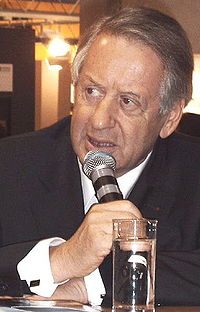Paul Spiegel

You can help expand this article with text translated from the corresponding article in German. (October 2022) Click [show] for important translation instructions.
|
Paul Spiegel (31 December 1937, in
Early life
Paul Spiegel was born into a
Siegel was the nephew of Siegmund, a cattle and horse trader, and Marga Spiegel, both of whom survived the Holocaust with the help of farmers and their families. Marga wrote the memoir Saviors in the Night, which was made into a film.[2][3]
Journalist
In 1958, he began practical training as a journalist with the Allgemeine Jüdische Wochenzeitung, now the Jüdische Allgemeine, in Düsseldorf. He was also active as an editor at this newspaper until 1965, when he became editor of the Jewish Press Service and assistant to the secretary-general of the Zentralrat der Juden. During the 1960s he worked for various other newspapers as well.
Zentralrat der Juden
In 1993 he became a member of the executive committee of the Zentralrat der Juden, first as vice president and later (as of 9 January 2000, following the death of
Equal status for Jewish community in Germany
On the 58th anniversary of the liberation of
Outspoken as leader
Spiegel was an outspoken critic of lawyers who took what he felt were overly large fees to represent Jews who had been
Death
Paul Spiegel died in the morning hours of 30 April 2006, in Düsseldorf, after suffering from cancer. He is survived by his wife, Gisèle Spatz, whom he married in 1964, and their two daughters.
Bibliography of Paul Spiegel
- Wieder zu Hause?, Ullstein Verlag München 2003, ISBN 3-548-36395-4
- Was ist ISBN 3-548-36713-5
- Gespräch über Deutschland. Interview with Wilfried Köpke Herder, Freiburg, 2006, ISBN 3-451-29292-0
- Shavua Tov! Eine gute Woche! Jüdische Türme aus Schwäbisch Gmünd., Stadt Schwäbisch Gmünd, 2001, ISBN 3-9807297-3-7
References
- ISSN 2195-1349. Retrieved 2022-10-13.
- ^ Stein, Ruthe. "Marga Spiegel's memoir inspires film". Hearst Communications, Inc. Retrieved 22 March 2014.
- ^ "Kinostart von "Unter Bauern" - Interview mit der jüdischen Zeitzeugin Marga Spiegel - Kultur - WDR.de". WDR. 2009-10-10. Retrieved 2023-04-21.
